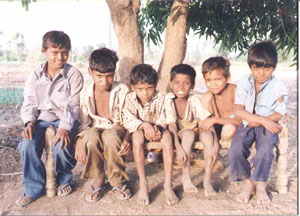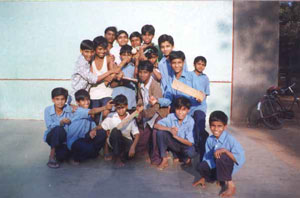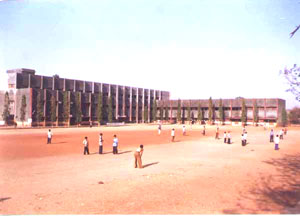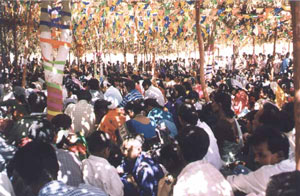EDUCATION
 The final development of the Adivasis can be brought about by continued
emphasis on both formal and non-formal education. Our concentrated efforts
at training them in the Co-operative system, community health, animal husbandry,
agricultural know-how are part of this Trusts through non formal means.
The final development of the Adivasis can be brought about by continued
emphasis on both formal and non-formal education. Our concentrated efforts
at training them in the Co-operative system, community health, animal husbandry,
agricultural know-how are part of this Trusts through non formal means.
Our Boardings and Primary Schools are part of the effort to utilize
the existing channels of the formal education system, while going beyond
its scope and offering the students some practical and vocational training.
Till the year 1995 we had only one Educational Trust (Adivasis Samajik
Kendra, Dediapada.) operating in the whole Taluka (Province) of Dediapada.
In the beginning of 1996 two more Educational Trusts had been registered
for educational activities with the following names : Adivasi Samajik Kendra
Educational Trust, Nani Singloti, and Adivasi Samajik Kendra, Relwa. At
the same time for Social and development works two more Trusts were registered
namely: Dediapada Social Service Society, Nani Singloti and Dediapada Social
Service Society, Kelwa. This has been done in view of the two New Centers
established in two regions of Nani Singloti and Relwa.
Our educational efibrts can be divided into
-
Grihini Courses
-
Boardings
-
Schools
GRIHINI COURSES
The Grihini courses had been run by the nuns twice a year each course lasting
four to six months. The participants are mainly illiterate young girls
of marriageable age and young housewives. They were taught the basic of
home science, cooking, needle-work, stitching, cleanliness, hygiene, child
- care, moral values and so on. All this was geared towards helping them
to be better housewives and mothers. They were also taught elementary reading
and writing. Besides values like Co-operation, unity and service were installed
in them. These courses of Grihini are not run any more in Dediapada Center.
At present the Mahila Mandal and health workers have taken up these activities.
And the women, trained previously in Grihini courses, are conducting short-term
courses in the villages for training village women.
BOARDINGS
Our educational efforts for children started in 1968 at Dediapada when
we set up small boarding with thirty-seven boys. The Sisters started the
following year with fifteen girls. Five years later we set up another boarding
with 50 boys in the villages of Navi Fali in Sagbara Taluka. In the year
1982 Sagbara became an independent center, and at present the Educational
Trust of Sagbara Mission, Navrachna Ashram, is running two primary Schools
and one High School.
Today there are 250 girls studying form std./grades 2 to 12 in the
boarding schools of Dediapada run by the Sisters. In the boys boarding
there are 469 boys studying from stds/grade 5 to 11 In the year 1982 two boardings
were started, one at Relwa and the other at Nani Singloti. 
Nani Singloti has in this academic year (1996 - 97), 315 students in
the boarding school. These children are from std./grades 1 to 7. Kelwa has at present in the Boarding School from std./grade 1 to 7.
The mere fact that children are able to complete their primary education
is a great achievement towards the increase of literacy, because the vast
majority of our village population is illiterate.
In our boarding school much attention is paid to regular hours of systematic
study. The idea is to inculcate in the students habits of steady work.
And this is done under the personal supervision and individual attention
given to the children.
A great stress is laid on the total development of the child through
the experience of living together. Values like honesty, good manners, truthfulness,
hard work, sharing, brotherly concern, love and service are taught to the
children.
There is a great deal of scope for creativity, which brings out the
hidden talents in each child, to this end, extra-curricular activities
are regularly held. Adivasis singing and dancing, bamboo work, etc. help
them not to loose touch with what is beautiful in their culture. Besides
this we have folk dances, garbhas, debates and elocution competitions,
drawing and essay competition, group discussions, leadership training,
sports and games in the boarding curriculum.
About 25% of them will go back to their villages after their primary
education, taking along with them all they have learnt and assimilated.
The rest who are more talented and more courageous will go for High
School studies and thereafter study in some Colleges or Technical Schools.
We have 2 Technical Schools with the boarding attached, one at Sevasi and
the other in Ankleshwar. Others will take up semi- skilled careers such
as carpentry, animal husbandry, and agriculture.
SCHOOLS:
Through our boardings we have been trying to help our Adivasis get the
benefits of formal education. The parents, illiterate themselves, prefer that the children graze cattle,
look after the smaller kids at home or even lend a helping hand in their
fields.
Many villages have a local board School up to std./grade 4. But very
few villages have Schools from std. 4 to 7, and therefore for most of these
children formal education beyond this level is not available.
Actually in Dediapada taluka there are, as it has been mentioned before,
34 Upper Primary Schools std./grade 5 to 7 and nine high Schools and 2
Higher Secondary Schools. Out of these schools 11 Upper Primary Schools,
8 High schools and 1 Higher Secondary School are run by politicians through
private trusts. All these schools have boardings attached to them and the Schools, as
well as the boarding are financed fully by government.
Our trusts are running 2 Primary Schools, 3 Upper Primary schools, 1
High School and 1 Higher Secondary School. We started these schools at
the request of Government Officials and local trials of Dediapada taluka.
The reason of making this request was to improve the educational standard
in Dediapada Taluka. The academic performance of all the schools was very
low, and only an average of 8 to 15 percent would pass the final examination
of the high school and higher Secondary. The final results of our schools are excellent. Every year the average
of the students who pass the exams successfully is nearing 100%. In the
year 1991 our school was awarded by Gujarat Government as the best rural
school in the whole of South Gujarat.
The explanation given by the politicians to justify the poor performance
of their schools was that the Adivasis were not intelligent. This myth
was broken by the results of the Adivasis in our School. This new educational effort on our part., being rural based, will help
the students to remain close to their people and culture. The education
imparted in our schools will thus be relevant, and it will also ensure
them employment once they finish schooling, because the present policy
of the government is to give certain preferences to tribal candidates in
most of the government jobs available in the jungle and rural areas.
Back to the Main Page

 The final development of the Adivasis can be brought about by continued
emphasis on both formal and non-formal education. Our concentrated efforts
at training them in the Co-operative system, community health, animal husbandry,
agricultural know-how are part of this Trusts through non formal means.
The final development of the Adivasis can be brought about by continued
emphasis on both formal and non-formal education. Our concentrated efforts
at training them in the Co-operative system, community health, animal husbandry,
agricultural know-how are part of this Trusts through non formal means.

